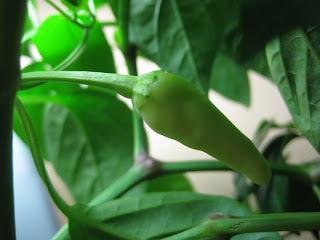I realized I never gave an update on my Aerogarden chili peppers since they were but seedlings. Well, the story is not great. Of seven plants, only two ended up surviving. Ironically, the reason that two of the plants didn't make it is because the overachieving plant ended up sucking up all the nutrients and blocking the smaller plants from getting light.
The big plant did bloom a ton of flowers, but it seems that they were all falling off without bearing fruit. Finally, the big plant produced one chili, which I was very proud of.
Alas, despite a ginormous plant that ended up being the size of Cleveland, only two chilis ended up growing in total. Worse, the bigger plant ended up growing so big that it even choked the light out from the slightly smaller plant, before eventually falling from its own weight (despite my holding it up with all my trellises). It was like some strange plant murder-suicide plot. In any case, it had gotten to the point that when I went on two West Coast trips, leaving the plants to fend for themselves with no water or nutrients. When I came back the plants were no more.
Still, if you've been following this blog at all you'll know I'm not a quitter! I tossed the underperforming plants and wrote to Aerogarden, asking if they could send replacements pods for the ones that didn't grow. I've always been incredibly impressed with them, because they sent over three new pods, a mini jalapeno and two red fires. I still have an extra purple super hot from the original package.
And so I'll be starting all over, taking in mind the lessons I learned from this go around. Among other things:
1) Prune, prune, prune at 3-4 weeks. One thing I didn't do last time was to prune the plants at 3-4 weeks. This is what caused the one big plant to grow out of control and eventually finish off all its siblings. In retrospect, while it seems like its a waste to chop off healthy leaves, what you're doing is strengthening the main stem so that it can be stronger and support more branches. Plus, the top leaves you chop off would just grow into the light and be burned anyway.
2) Prune leaves. Some of the leaves grew so big they ended up overwhelming the entire garden. In retrospect, all they do is suck out more water and nutrients. The next go around, any leaf that gets too big is going to be plucked off.
3) Pollinate the flowers. I've had experience with this with tomato plants, where you shake the plants to pollinate them (actually, my preferred method is to tap them with my fingernails until I see a little cloud of dust coming from the flower). With the last go-around of the chili plants, I must have started this too late, as every time I shook the plants the flowers flew right off. I think the right thing to do is to start even when the flowers are at bud form, and do it every other day when the lights are on.
4) Remove dead leaves. As the plants grew and grew and had nothing to show for them, I got a little lazy about cleaning the area on the garden surface and pruning wilting leaves on the plant. This can cause all kinds of icky stuff to form, making it an eyesore and making cleanup rather unpleasant.
5) Read the manual. All of the tips above are in the handy manual that Aerogrow gives with the seed kits. Admittedly, I had grown a little lazy, and didn't bother to read them. Even if you know what you're doing, it never hurts to give yourself a refresher.
So, having said all that, I've already washed and sanitized my Aerogarden VeggiePro (or Aerogarden Extra as it's called now), and I'll be planting my 4 chili seed pods this week.

